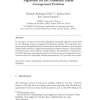703 search results - page 26 / 141 » Maintenance scheduling problems as benchmarks for constraint... |
CP
1997
Springer
13 years 11 months ago
1997
Springer
A number of pitfalls of empirical scheduling research are illustrated using real experimental data. These pitfalls, in general, serve to slow the progress of scheduling research b...
SBACPAD
2003
IEEE
14 years 21 days ago
2003
IEEE
— Scheduling by Edge Reversal (SER) is a fully distributed scheduling mechanism based on the manipulation of acyclic orientations of a graph. This work uses SER to perform constr...
COR
2008
13 years 7 months ago
2008
In this paper, an improved Two-Stage Simulated Annealing algorithm is presented for the Minimum Linear Arrangement Problem for Graphs. This algorithm integrates several distinguis...
CPAIOR
2004
Springer
14 years 25 days ago
2004
Springer
This paper addresses the question of selecting an algorithm from a predefined set that will have the best performance on a scheduling problem instance. Our goal is to reduce the e...
ECAI
2008
Springer
13 years 9 months ago
2008
Springer
Abstract. Some constraint problems have a combinatorial structure where the constraints allow the sequence of variables to be rotated (necklaces), if not also the domain values to ...

